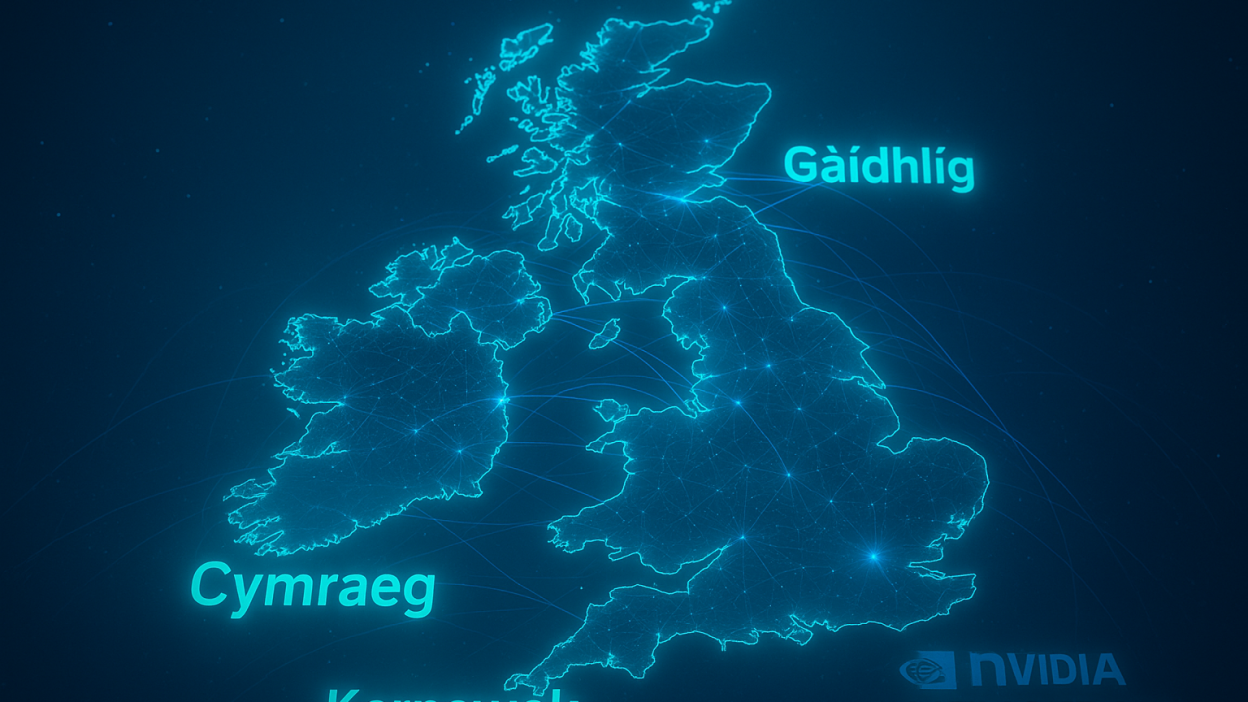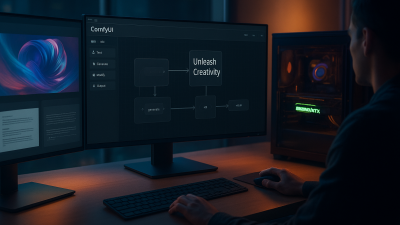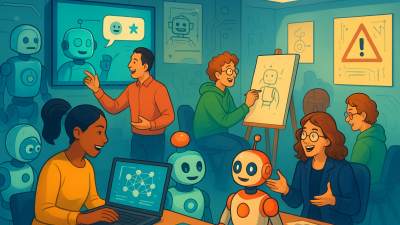Bridging the Isles: UK-LLM Powers AI for UK Languages Using NVIDIA Nemotron
The United Kingdom’s linguistic heritage is as varied as its landscapes. Nestled within bustling cities and rolling hills are communities that speak Welsh, Scottish Gaelic, Cornish, and Irish—languages that carry centuries of culture, tradition, and identity. Yet, in an increasingly digital world, these languages are often sidelined by technology designed primarily for global lingua francas.
Enter UK-LLM, an ambitious AI-driven initiative that aims to change this narrative. In partnership with NVIDIA Nemotron, one of the most powerful AI computing platforms available today, UK-LLM is making it possible for artificial intelligence to learn, understand, and support regional languages with unprecedented sophistication and care.
This effort is about more than machine learning models—it’s about reconnecting communities, preserving linguistic heritage, and creating equitable access to technology across the Isles.
A Historical Challenge
For decades, AI and language technologies have revolved around dominant languages such as English, Mandarin, and Spanish. Even widely used translation tools struggle with minority languages, let alone rare dialects or languages with complex grammatical structures. The absence of digital resources, open datasets, and trained models means that communities who speak these languages are often excluded from digital services.
For instance:
-
A rural healthcare clinic in the Scottish Highlands may rely on family members for translation when doctors communicate treatment plans.
-
Students learning in Welsh or Irish schools face fewer AI-based educational tools compared to English-speaking peers.
-
Local governments struggle to provide accessible information to all citizens in their preferred languages.
These gaps hinder inclusion, limit innovation, and threaten the survival of cultural knowledge that has been passed down through generations.
Why AI Needs to Learn Regional Languages
Artificial Intelligence is increasingly embedded in services like customer support, content creation, data analysis, and healthcare. Without linguistic diversity, these tools fail to serve large segments of the population.
Here’s why it matters:
Cultural Preservation
Languages are carriers of traditions, folklore, history, and identity. AI that understands regional languages helps in digitizing oral traditions, archiving literature, and translating historical texts.
Digital Equity
Language barriers shouldn’t prevent access to healthcare, education, legal services, or government information. AI can remove these obstacles by providing accurate translations and personalized interactions.
Economic Opportunity
Local businesses can scale their services by reaching niche markets, offering customer support, and advertising in languages that resonate with their communities.
Social Engagement
Inclusive technology fosters civic participation, especially in rural or remote areas where language is central to community bonding.
How UK-LLM Works: Powered by NVIDIA Nemotron
At the core of this initiative lies a seamless integration of linguistic research and cutting-edge hardware acceleration.
NVIDIA Nemotron – The AI Backbone
Nemotron is NVIDIA’s high-efficiency platform that powers large language models at scale. It reduces training time, optimizes memory usage, and increases throughput—allowing developers to build complex AI systems without excessive infrastructure.
Key features include:
-
Parallel processing of massive datasets
-
Reduced latency for real-time language tasks
-
Scalability across multiple regions and dialects
-
Energy-efficient training without performance compromise
This makes it possible to create language models that can:
-
Distinguish between dialectical nuances
-
Interpret idioms, colloquialisms, and grammar variations
-
Generate human-like responses that are contextually appropriate
Data Collaboration and Ethical AI
UK-LLM is not just about data aggregation—it’s about responsible data use. The initiative actively collaborates with linguistic experts, universities, and local cultural organizations to ensure that AI models are trained on authentic datasets without exploiting communities or eroding trust.
Privacy and consent protocols are enforced to safeguard personal information while creating open datasets for academic and commercial applications.
Real-Life Applications and Success Stories
Healthcare: Real-Time Translation for Remote Communities
In pilot programs, AI-powered translation tools have allowed medical professionals to communicate with patients in Welsh and Gaelic, improving diagnosis accuracy and patient trust.
“For the first time, I felt like I was being heard without an interpreter standing between me and my doctor,” shares a patient from North Wales.
Education: Empowering Students with Local Language Learning
AI tutors now assist students by offering exercises, explanations, and practice quizzes in minority languages—helping schools retain students and boost learning outcomes.
Media & Publishing: Reviving Literary Traditions
Local authors and broadcasters are using AI tools to produce content, from podcasts to documentaries, that celebrate regional dialects while making it accessible to younger audiences.
Public Services: Enhancing Local Governance
Government agencies are now equipped to provide multilingual portals and customer service interfaces, ensuring that residents feel included in policy-making processes.
Challenges and Considerations
No technological solution is without obstacles. UK-LLM faces challenges such as:
-
Data scarcity: Minority languages have limited written records, requiring creative approaches like crowd-sourced datasets.
-
Ethical representation: AI models must respect cultural contexts and avoid reinforcing stereotypes.
-
Infrastructure gaps: Remote regions may lack internet access, requiring offline or low-bandwidth solutions.
-
Long-term sustainability: Preserving languages through AI demands continued investment in community partnerships and education.
By addressing these challenges head-on, UK-LLM aims to build a model that’s scalable, ethical, and community-driven.
The Human Element: Why It Matters Beyond Code
At its heart, AI is about enabling humans to live fuller, more connected lives. When a grandmother in Cornwall can access medical advice in Cornish, when a child in the Highlands learns to read in Gaelic, or when a Welsh poet’s voice reaches global audiences, technology becomes a bridge—not a barrier.
Dr. Elinor Hughes, a sociolinguist advising UK-LLM, reflects:
“Language is more than words—it’s who we are. AI that listens and learns with compassion can bring dignity and belonging to communities that have been overlooked for far too long.”
Looking Ahead: A Global Model for Inclusive AI
The UK-LLM initiative sets a new standard for how AI can embrace diversity rather than erase it. The roadmap includes:
-
Public APIs for developers
-
Open datasets for academic research
-
Cross-border collaborations for global minority languages
-
Community-driven content creation programs
With NVIDIA Nemotron’s computational strength and UK-LLM’s human-centered philosophy, this initiative is poised to inspire similar models worldwide—from indigenous languages in Australia to endangered dialects in Africa.
Join the Movement for Inclusive AI
Be part of a groundbreaking initiative that empowers regional languages and fosters equity in education, healthcare, and public services. Subscribe now to get the latest updates from UK-LLM.
FAQs
Q1: What makes UK-LLM different from other AI language projects?
UK-LLM combines advanced computational technology with cultural research, ensuring that AI tools reflect authentic language use while respecting privacy and community concerns.
Q2: How does NVIDIA Nemotron enhance this project?
Nemotron accelerates AI training, allowing models to handle complex grammatical structures and contextual nuances efficiently while reducing energy consumption.
Q3: Who benefits from this initiative?
Students, healthcare providers, government agencies, content creators, businesses, and communities—anyone who relies on access to information and services in minority languages.
Q4: How are communities involved?
Local organizations, educational institutions, and language experts collaborate with UK-LLM to curate datasets, guide ethical practices, and ensure that AI tools reflect real-world usage.
Q5: Can this model be applied to other countries?
Absolutely. UK-LLM’s framework offers a replicable blueprint for inclusive AI development that can support minority languages and indigenous communities globally.
Note: Logos and brand names are the property of their respective owners. This image is for illustrative purposes only and does not imply endorsement by the mentioned companies.



